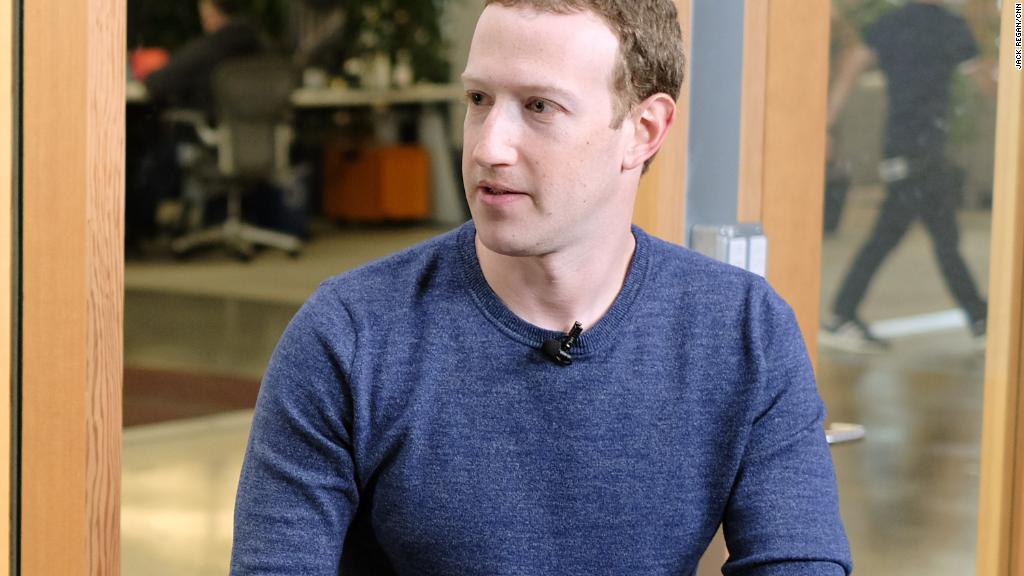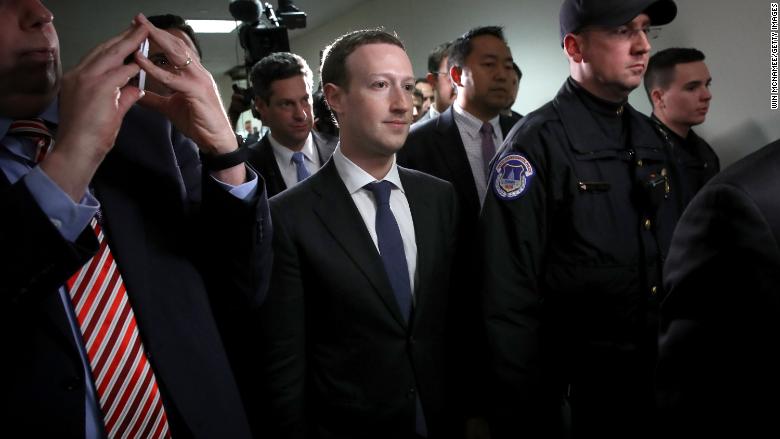
Facebook's press page was once filled with announcements about new features to order food and connect to friends in virtual reality.
Now it's almost entirely devoted to addressing Facebook's crisis of confidence.
There have been more than a dozen company blog posts about data privacy and election meddling in the three weeks since news of the Cambridge Analytica scandal first broke.
Facebook announced a batch of restrictions on the data that third-party apps access and overhauled its terms of service. Its CEO Mark Zuckerberg even held a rare and wide-ranging conference call with reporters. And that was just in a single day last week.
Facebook (FB) also removed hundreds of pages and accounts run by a Kremlin-linked troll army, announced plans to label all political and issue ads and introduced a research initiative to study the impact of social media on elections.
Head spinning? You're not alone.
The flurry of activity highlights Facebook's rush to get its house in order before Zuckerberg's high-stakes debut testifying on Capitol Hill this week. Zuckerberg is set to appear before a joint hearing of the Senate Judiciary and Commerce committees on Tuesday afternoon followed by a House Energy and Commerce Committee hearing on Wednesday morning.

Related: Have questions about your data and Facebook? We want to hear from you
According to a source familiar with Facebook's plans, Zuckerberg and his team did mock hearings over the past week in a conference room at Facebook set up to look like a congressional hearing room. Zuckerberg plans to be contrite in his appearances before lawmakers. He will make the case for Facebook — why it helps people's lives — but be ready to push back when appropriate.
"He's nervous, but he's really confident," the source said. "He's a smart guy."
By flooding the zone with product fixes and executive interviews, Facebook has effectively armed Zuckerberg with more convincing talking points to use when he gets grilled by Congress. The sheer number of updates also all but ensured that some announcements would get buried in the news cycle.
But Facebook's latest PR effort may still prove to be too little, too late.
"This is like spraying five gallons of water on a growing forest fire," says Daniel Ives, an analyst who tracks Facebook for GBH Insights. "It helps around the edges, but ultimately for Zuckerberg & Co., the heat from the regulators is inevitable."
A spokesperson for Facebook did not immediately respond to a request for comment.
The Congressional hearings are in response to news that Cambridge Analytica, a data firm with ties to President Donald Trump's campaign, accessed information from as many as 87 million Facebook users without their knowledge.
Related: What Mark Zuckerberg has to fear in testifying before Congress
The controversy wiped away tens of billions of dollars from Facebook's market value, prompted political scrutiny on both sides of the Atlantic and even raised the once unthinkable question of whether Zuckerberg should step down as CEO.
When he goes before Congress, Zuckerberg won't just be held to account for a single mistake with user data. As the first CEO of today's big internet platforms to testify, Zuckerberg will have to address years of mounting concerns about social media's impact on the world's privacy, civil discourse and democratic institutions.
"It's clear now that we didn't do enough to prevent these tools from being used for harm as well. That goes for fake news, foreign interference in elections, and hate speech, as well as developers and data privacy," Zuckerberg said in prepared remarks for Wednesday's hearing.
"We didn't take a broad enough view of our responsibility, and that was a big mistake. It was my mistake, and I'm sorry. I started Facebook, I run it, and I'm responsible for what happens here."
In the lead-up to the hearing, Facebook tried to own up to its mistakes and take control of the news narrative. But its announcements and executive statements only ignited more controversies.
In one update last week, Facebook upped the estimate for the number of people whose data may have been accessed by Cambridge Analytica and revealed that "most people on Facebook" may have had their public profile information scraped by malicious actors. The news raised the prospect of a fresh data scandal, this time potentially impacting billions.
Facebook was also forced to apologize after civil society groups in Myanmar criticized Zuckerberg's explanation in a recent interview of how the company handled hate speech in the country.
Even Zuckerberg's apologies have been criticized. As Wired put it, the CEO has been on a "14-year apology tour."
Paul Argenti, a professor of corporate communication at the Tuck School of Business at Dartmouth, says the numerous Facebook announcements are not doing the company any favors. It's "just calling attention and asking for articles to be written," he said.
To make matters worse, there has been a steady drip of damaging revelations about the company in the days leading up to Zuckerberg's testimony.
Zuckerberg was forced to disavow a controversial internal memo from a top executive that surfaced in the media late last month. Facebook also confirmed that it scans user messages for abusive links and images and acknowledged removing Zuckerberg's personal Facebook messages from other users' inboxes -- an option unavailable to normal users.
On Monday night, CNN reported that the biggest Black Lives Matter page on Facebook is fake, once again raising questions about the integrity of Facebook's platform.
Zuckerberg has already shown he's willing to apologize. As his moment in the hot seat nears, however, the list of things to apologize for only seems to be getting longer.
--- CNN's Laurie Segall contributed to this report.

